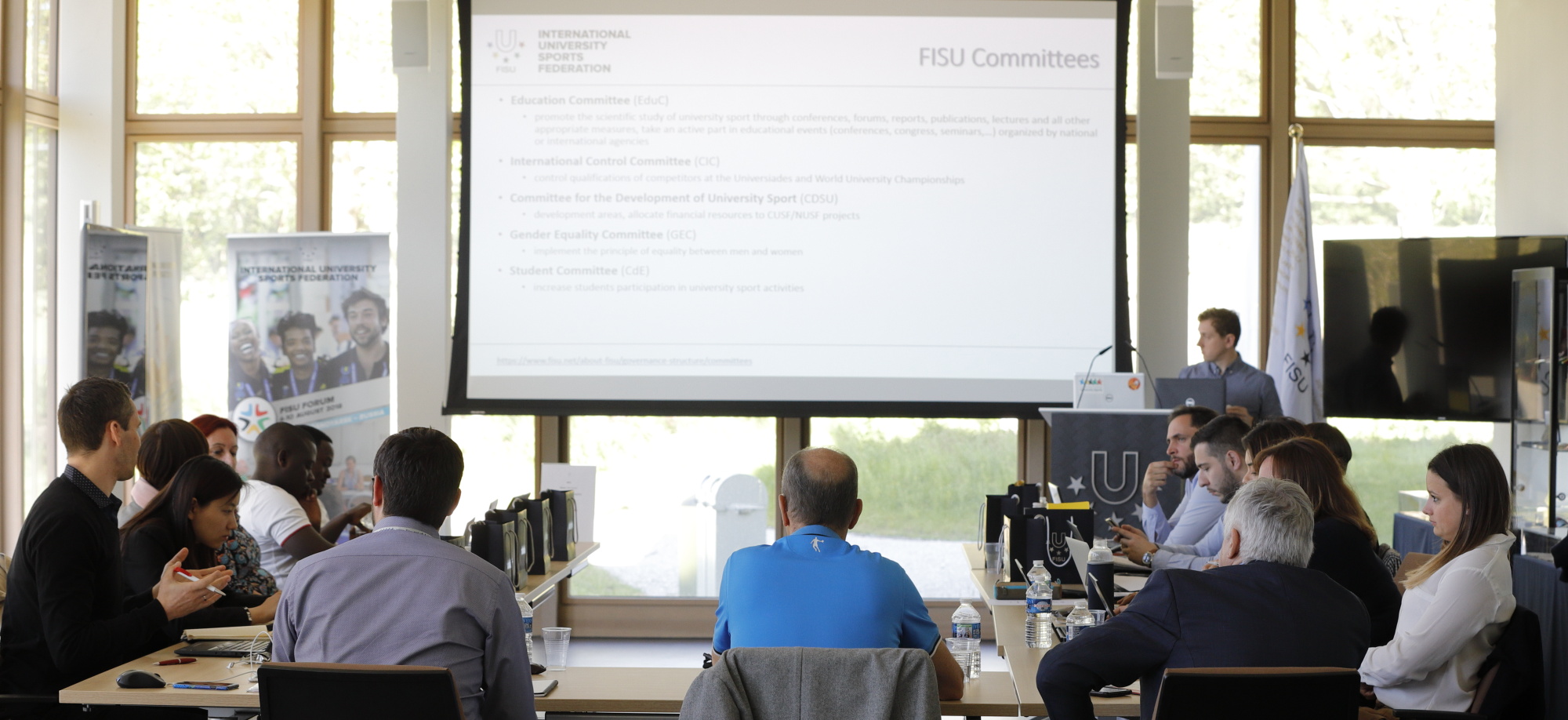LAUSANNE – The first ever Continental University Sports Federation (CUSF) staff seminar hosted by FISU at its headquarters in Lausanne resulted in all parties agreeing to closer cooperation, especially in the areas of marketing and sports event calendars.
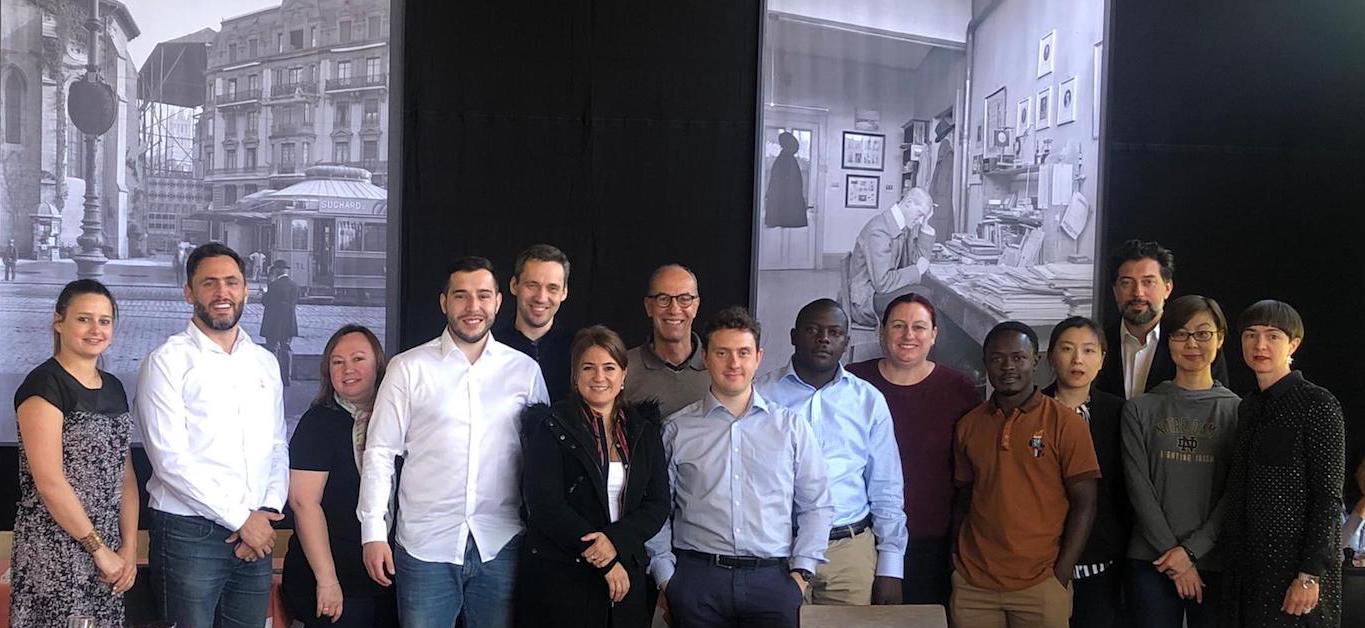 The two-day seminar held on 14-15 May was an initiative from FISU’s Education & Development department, to bring together executive staff from five continental member associations with FISU’s central team. The objective was to align strategies and find common courses of action to further the university sport movement worldwide.
The two-day seminar held on 14-15 May was an initiative from FISU’s Education & Development department, to bring together executive staff from five continental member associations with FISU’s central team. The objective was to align strategies and find common courses of action to further the university sport movement worldwide.
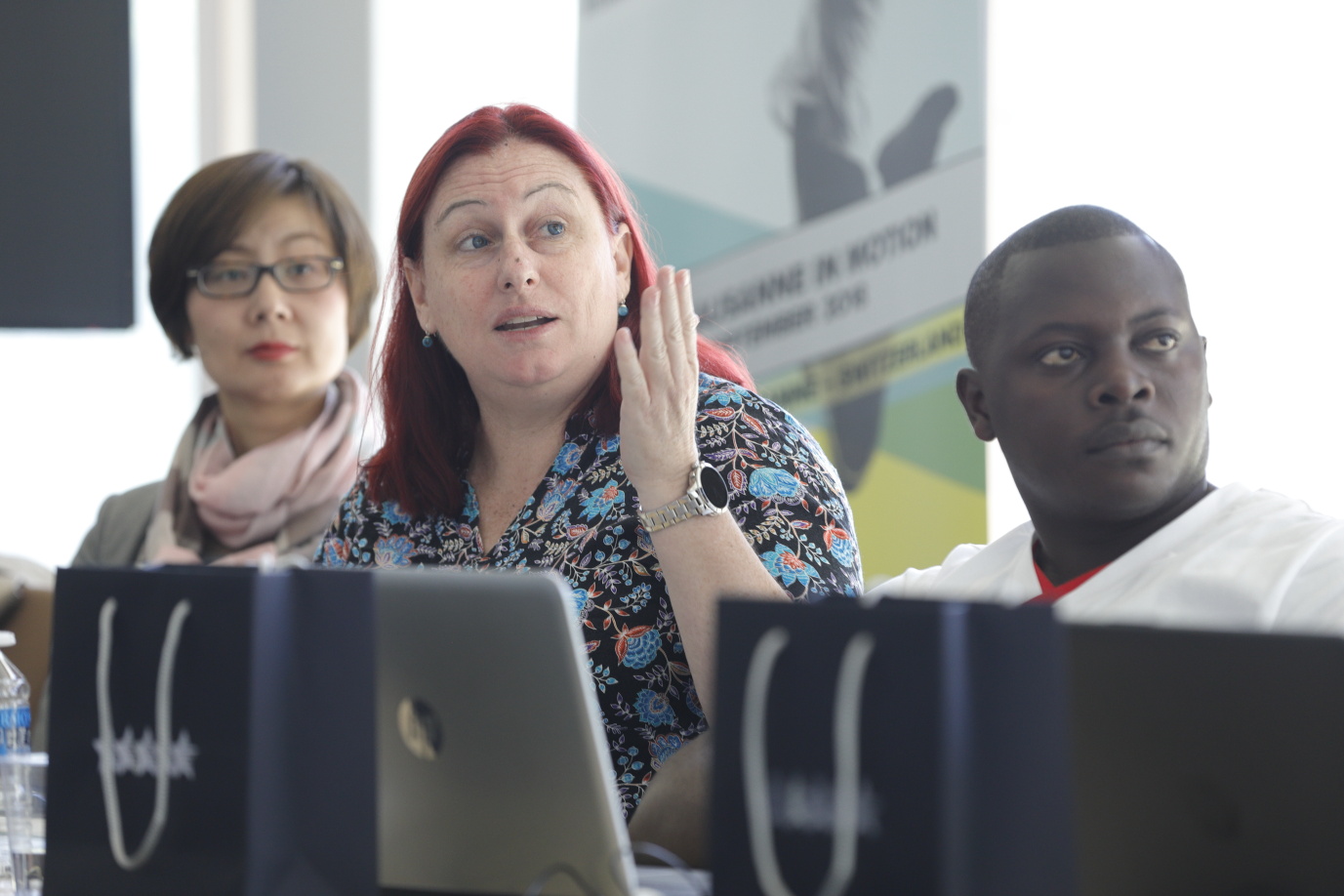 Donna Spethman, FISU OceaniaThe central objective was to exchange ideas and best practices. Donna Spethman from FISU Oceania highlighted the workshops they conduct to help each member nation develop certain competencies. Australia being one of the most active National University Sports Federations (NUSF), FISU Secretary General Eric Saintrond suggested that other CUSF and NUSF members could benefit from an observer programme in Australia.
Donna Spethman, FISU OceaniaThe central objective was to exchange ideas and best practices. Donna Spethman from FISU Oceania highlighted the workshops they conduct to help each member nation develop certain competencies. Australia being one of the most active National University Sports Federations (NUSF), FISU Secretary General Eric Saintrond suggested that other CUSF and NUSF members could benefit from an observer programme in Australia.
“I encourage you to invite observers to the Australian University Games, for a transfer of knowledge,” said Saintrond. “You have more than 6000 athletes, 32 events. It would be a great learning for some of the lesser experienced NUSFs.”
On behalf of the Asian University Sports Federation (AUSF), Wei Sun and Irene Wang informed the group that the AUSF sport calendar has been redrawn since 2017.
“We used to have several compulsory championships,” said Irene Wang. “From 2017 onwards, we tried to finalise the championships for odd and even years. The calendar was made after we conducted a survey to choose and focus on the most popular sports in Asia.”
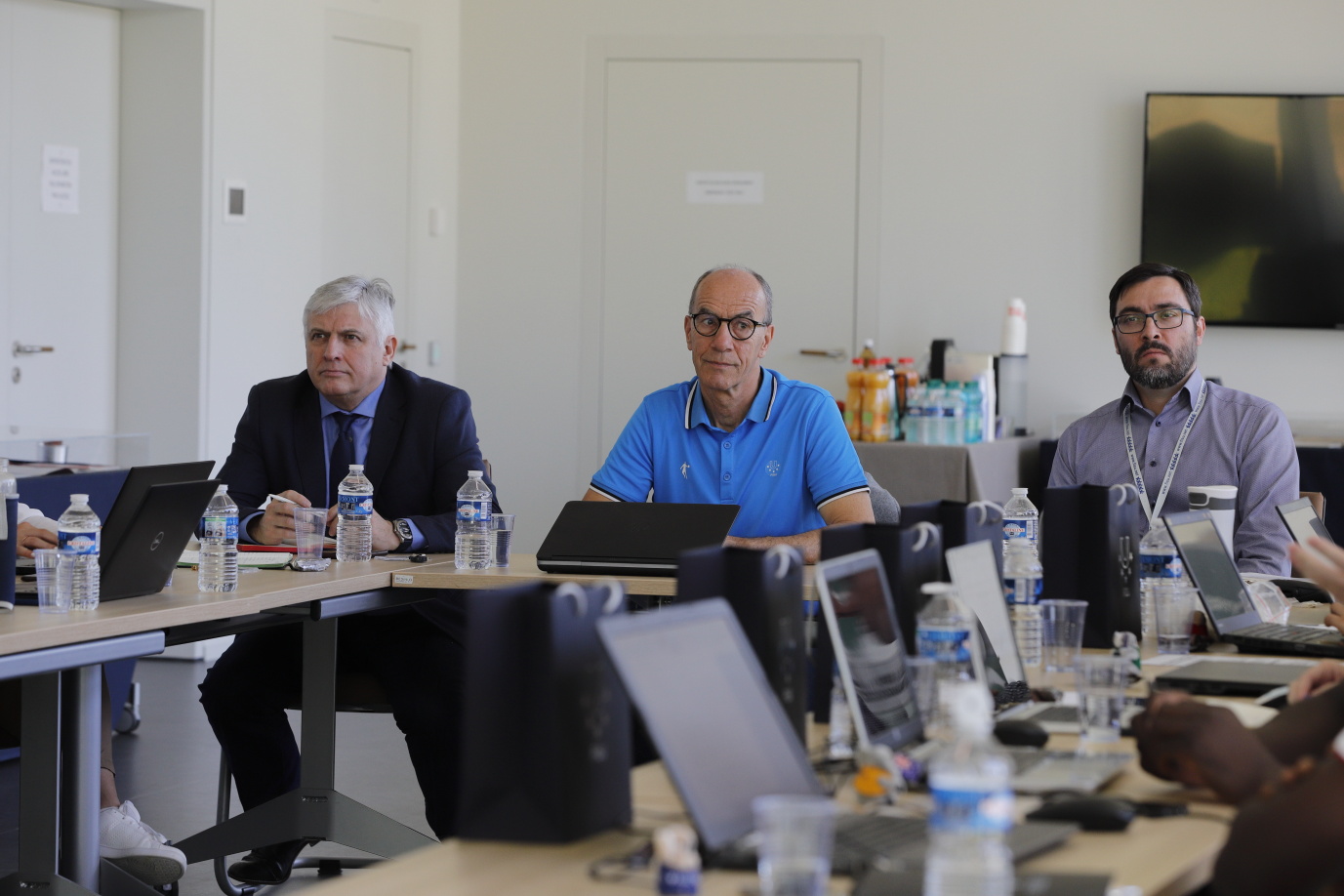 Eric Saintrond, Leonz Eder and Paulo FerreiraOver the two days of the session, one of the conclusions that emerged was that indeed, a common sports calendar across FISU and its CUSF partners is a necessity for more integrated operations.
Eric Saintrond, Leonz Eder and Paulo FerreiraOver the two days of the session, one of the conclusions that emerged was that indeed, a common sports calendar across FISU and its CUSF partners is a necessity for more integrated operations.
As FISU First Vice President Leonz Eder said, “We want to try and establish closer co-operation with all of you, for you to understand the FISU work procedures and approach. This was the very goal of holding this seminar with all of you.”
Another common goal agreed upon, was further help in branding and marketing to all CUSFs and through them, to the NUSFs. Hannington Musoke of the Federation of Africa University Sports (FASU) spoke of how the 2018 FASU Games were a success and one of the reasons was consistent branding and messaging.
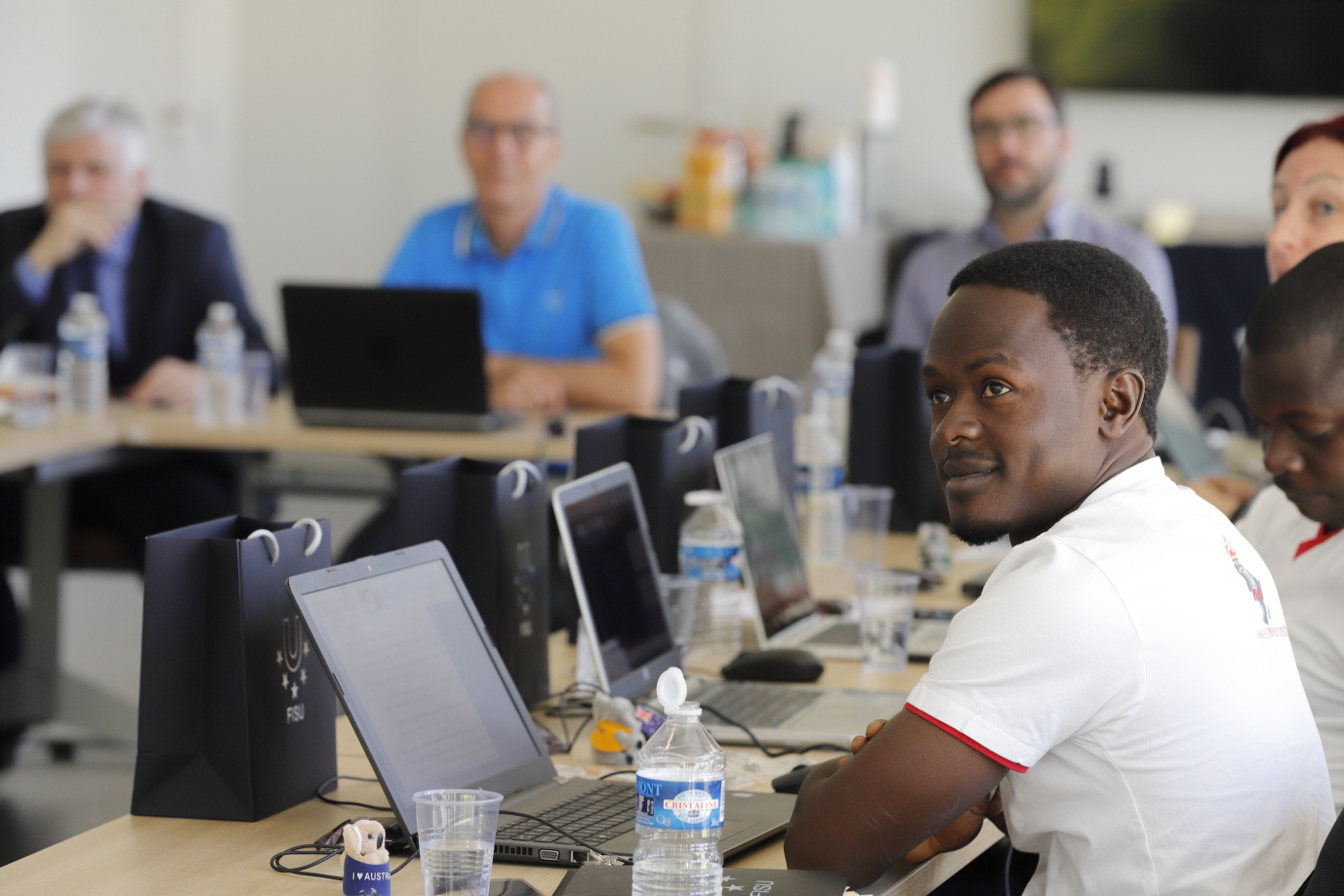 Hannington Musoke (foreground), FASU “The #WeAreAfrica hashtag has really picked up and we intend to promote it even further,” he said. He also mentioned that thanks to the FASU Games, the Mekelle University (Ethiopia) has benefited from a lasting legacy.
Hannington Musoke (foreground), FASU “The #WeAreAfrica hashtag has really picked up and we intend to promote it even further,” he said. He also mentioned that thanks to the FASU Games, the Mekelle University (Ethiopia) has benefited from a lasting legacy.
“The University has now got a whole new infrastructure,” said Musoke. “It is a real gift to athletes of the university and the region.”
While funding and resources remain among the prime challenges of all CUSFs, FISU America’s Ines Gomez and Lucas Pontes mentioned that the challenge becomes even greater when they deal with three subcontinental associations, one for South America, one for North America and ODUCC which oversees the islands.
Ines Gomez mentioned that ODUCC organises all its competitions with teams competing for their universities and raised the question about what is happening in other continents.
Julius Lukwago from FASU gave an example of his country, Uganda, and said that “It is easier to mobilise funding for students to participate for their universities, rather than nations. We write directly to the Vice-Chancellors of the universities and identify athletes as representatives of different universities, even at the Universiade. We are trying to share this idea with other countries of Africa.”
 Besim Aliti, Sara Rozman of EUSALucas Pontes said, “Brazil played university teams (last season) for all the national university sports championships – basketball, volleyball. We are trying to find the best way to do that as we know the general movement is in that direction.”
Besim Aliti, Sara Rozman of EUSALucas Pontes said, “Brazil played university teams (last season) for all the national university sports championships – basketball, volleyball. We are trying to find the best way to do that as we know the general movement is in that direction.”
Sara Rozman and Besim Aliti of European University Sports Association (EUSA) stressed on the importance of promotion and making live action available digitally.
“We have an obligatory live stream for all our events, except rowing and orienteering,” said Aliti. “Having a consistent timing and scoring provider has worked out well for standardising our live stream.”
At the end of the seminar, it was agreed that involving more NUSFs as observers and volunteers in events is a good way forward towards creating a stronger community. The FISU leadership also emphasised that it is key for FISU to have CUSFs involved in the communication chain with NUSFs and ultimately universities, in keeping with FISU’s Global Strategy.
FISU Director General Paulo Ferreira summed it up by saying, “Ours doors are always open for you. We’re in the same boat, so let’s sail to a good place together.”
